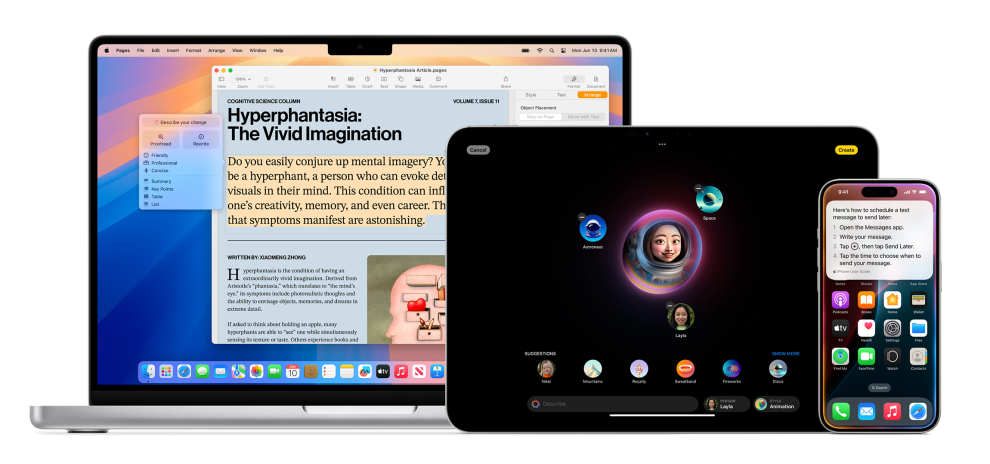What is Apple Intelligence?
Apple Intelligence is not just an upgrade; it’s a paradigm shift. This suite of powerful AI technologies is designed to understand users on a deeper level, anticipate their needs, and seamlessly integrate into their daily routines. Built on machine learning algorithms trained on a massive dataset of user interactions, anonymized data points, and contextually relevant information, Apple Intelligence promises a more intuitive user experience.
The Rise of a Superpowered Siri
Siri, once known for its occasional misinterpretations and frustrating limitations, is now infused with the power of Apple Intelligence. This translates to several key improvements:
- Enhanced Natural Language Processing (NLP): Siri can now understand complex sentences, follow multi-step requests, and grasp the nuances of human conversation. Gone are the days of needing to phrase your queries in a specific way for Siri to comprehend.
- Contextual Awareness: Apple Intelligence empowers Siri to learn from your habits, preferences, and the data stored within your Apple ecosystem. This allows Siri to anticipate your needs, proactively suggesting actions and offering relevant information based on the current context.
- Cross-App Functionality: No longer confined to specific tasks, Siri becomes a true digital assistant, capable of working seamlessly across different Apple apps. Imagine asking Siri to compile a workout playlist based on your fitness goals stored in the Health app, or requesting it to summarize a news article and add key points to your Calendar for later review.
- Privacy by Design: Apple has always emphasized user privacy, and this remains a cornerstone of Apple Intelligence. All data processing occurs on-device, ensuring your personal information remains secure. The system learns from anonymized data points and user interactions, continuously improving without compromising your privacy.

Siri’s New Skillset: A Glimpse into the Future
With Apple Intelligence at its core, Siri unlocks a world of possibilities:
- Smarter Home Management: Imagine controlling your smart home devices with natural language commands. Say “Siri, dim the lights to 20% and close the blinds” or “Adjust the thermostat to 72 degrees while I’m on my way home.”
- Personalized Productivity: Siri can become your ultimate productivity partner. Ask it to manage your calendar, schedule meetings, and even transcribe voice recordings into text documents with remarkable accuracy.
- Travel Companion Reimagined: Need help navigating a new city or planning your next vacation? Siri can leverage its contextual awareness to provide personalized recommendations, translate languages in real-time, and even book reservations based on your preferences.
- Enhanced Accessibility: Siri’s improved understanding of natural language and ability to respond to different speaking styles opens doors for users with disabilities. Imagine voice control becoming more intuitive for visually impaired users, or voice commands tailored to recognize speech patterns for users with speech impediments.
Beyond Siri: The Ripple Effect of Apple Intelligence
The impact of Apple Intelligence extends far beyond Siri. This underlying technology has the potential to revolutionize the entire Apple ecosystem. Imagine:
- Proactive Notifications: Your Apple Watch alerts you about an upcoming meeting based on your calendar and location, along with the weather forecast for your destination.
- Smarter Photos App: Apple Intelligence can automatically categorize your photos based on location, people, and events, making searching and organizing your memories a breeze.
- Adaptive Learning Apps: Imagine educational apps tailoring their content and pace to your individual learning style, leveraging data points from your performance and progress.
The Road Ahead: Challenges and Considerations
While Apple Intelligence promises a future of seamless user experiences, some challenges remain:
- Ethical Considerations: As AI continues to evolve, ethical considerations surrounding bias and data usage become paramount. Apple will need to ensure that its AI algorithms are fair, unbiased, and respect user privacy.
- User Adoption: Learning to trust and integrate a more powerful virtual assistant into daily routines takes time. Apple will need to provide clear user education and intuitive interfaces to facilitate seamless adoption.
- Integration with Third-Party Apps: The potential of Apple Intelligence is truly maximized when it integrates with third-party apps. However, encouraging developers to leverage this technology will require clear guidelines and a robust developer ecosystem.
A New Era of Human-Machine Interaction

The unveiling of Apple Intelligence marks a turning point in the evolution of virtual assistants. With Siri as its flagship interface, Apple is poised to usher in a new era of human-machine interaction. Early reviews have been promising, highlighting significant improvements in Siri’s ability to understand natural language and follow complex instructions. The integration with various Apple apps is a welcome convenience, allowing users to manage tasks seamlessly. However, some reviewers noted a slight learning curve, particularly when dealing with multi-step requests.
Early Reviews: Siri Soars, But Questions Linger
The news of Apple Intelligence and its integration with Siri has sent ripples through the tech world. Early reviews offer a glimpse into the potential of this supercharged assistant, yet some lingering questions remain.
- Positive Impressions:
- TechCrunch: “Siri has undergone a metamorphosis… understanding complex queries and responding with contextually relevant information is a gamechanger.
- The Verge: “Apple Intelligence elevates Siri from a forgettable assistant to a valuable productivity tool. Cross-app functionality makes it a true contender in the virtual assistant race.”
- CNET: “The focus on privacy is commendable. On-device processing ensures data remains secure, building trust with users.”
- Areas for Improvement:
- Engadget: “While NLP is impressive, there’s still a learning curve for complex multi-step requests. More intuitive user interfaces could streamline interaction.”
- Wired: “The ethical implications of AI require ongoing vigilance. Apple needs to be transparent about data usage and address potential biases in its algorithms.”
- The Wall Street Journal: “The success of Apple Intelligence hinges on third-party developer adoption. Creating a robust ecosystem for integrating with existing apps will be crucial.”
The Future of Virtual Assistants
The arrival of Apple Intelligence marks a significant step forward for virtual assistants. With its focus on natural language processing, contextual awareness, and user privacy, Apple has laid the groundwork for a more intuitive and helpful virtual companion. However, the road ahead involves addressing ethical concerns, fostering developer adoption, and refining the user experience.
As Apple Intelligence continues to evolve, one thing is certain: the way we interact with our devices is on the cusp of a major transformation. Whether Siri can fully capitalize on its newfound power and dethrone competitors like Google Assistant and Amazon Alexa remains to be seen. But one thing’s for sure, the battle for virtual assistant supremacy has just become a lot more interesting.
















Add Comment